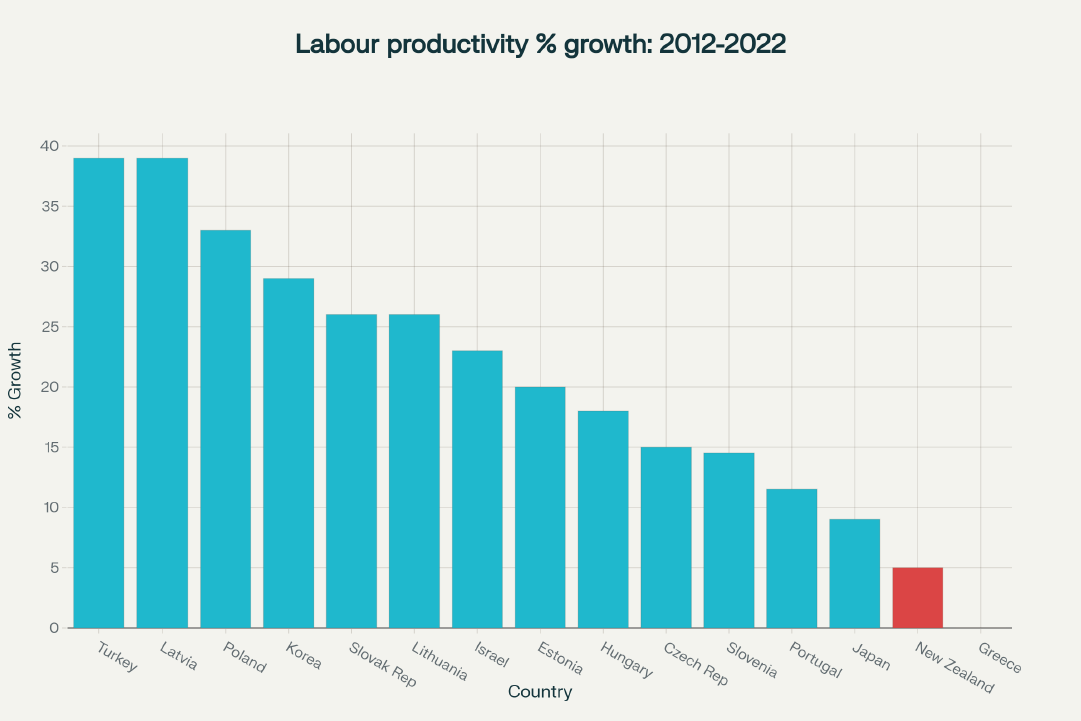
On the one hand, productivity measures give us valuable insight as they allow us to benchmark our performance against the rest of the developed world. On the other hand, it remains largely theoretical unless it drives real change at the organisational level.
It is becoming increasingly clear that New Zealand doesn’t just have a productivity issue. It has a performance issue.
Despite our resourcefulness, our labour productivity continues to lag. That gap isn’t just technical, it’s structural. And unless we respond differently, we’ll continue to fall behind.

This is not a short-term dip, it’s a decade-long trend. And it reflects more than just external pressures; it exposes something deeper about how we lead, work, and perform.
The cost of inaction
In the sectors where output and input can be measured independently, such as goods production, utilities, and logistics, recent productivity growth has been negative across all major categories.
In the year to March 2024:
- Labour productivity fell by 0.7%
- Multifactor productivity dropped 0.9%
- Capital productivity fell by 1.3%
- In 2023, inputs rose faster than outputs, driving further decline.
- While some industries showed gains in 2022, primary sectors declined.
New Zealand’s isolation, trade dependencies, and exposure to inflation only amplify this problem. Further to this, the three global challenges we’ve previously explored - economic and geopolitical volatility, technological disruption, and workforce disillusionment - are compounding their effects.
If this trend continues, we’ll face more than economic strain. We’ll see a long-term erosion of our competitiveness, living standards, and ability to invest in services that matter to New Zealanders.
So what can we do about it?
If we understand the problem, the question becomes: what is the most efficient and effective way to respond - now, not later?
We believe it starts by reframing the issue.
Instead of waiting for macroeconomic fixes or hoping for policy changes, we need to focus on lifting performance at an organisational level. The fact is, if enough businesses achieve a step-change in how they perform, we lift our national productivity from the inside out.
This isn’t idealism - it’s practical and leverageable. Every improvement in business performance strengthens our productivity and trajectory as a nation.
Purpose, Performance, and People
So, how can we achieve that kind of shift?
It starts by engaging people in something bigger than outputs. When teams understand the why behind a business and how their contribution connects to something bigger than themselves, performance changes.
New Zealand has countless examples of global excellence in sport, food production, creative industries, and technology. We know how to punch above our weight. But what if we extended that same ambition to how we build our organisations?
What if people believed their role mattered to the nation, not just their manager or the company they worked for?
When people feel they have a role to fulfil, a purpose in something that matters, they naturally bring more to the table. Not just in terms of productivity, but in care, creativity, and accountability.
A different kind of leadership
If businesses are simply focused on trying to extract more from their people in pursuit of profit, the downward trend will only accelerate.
As a result, the change we need is one of leadership. Simply put, we need more leaders to engage their people in a greater vision of what their business could become and how they, as individuals, could help them achieve it.
Performance rises when people feel their work matters to others.
If this shift happens at scale, we won’t just see a lift in our productivity. We’ll see stronger, more progressive businesses, a more robust tax base, and a greater ability to invest in the services that underpin our quality of life.
Click here to download our whitepaper - Transforming New Zealand's Productivity - and Join the conversation ⟶


